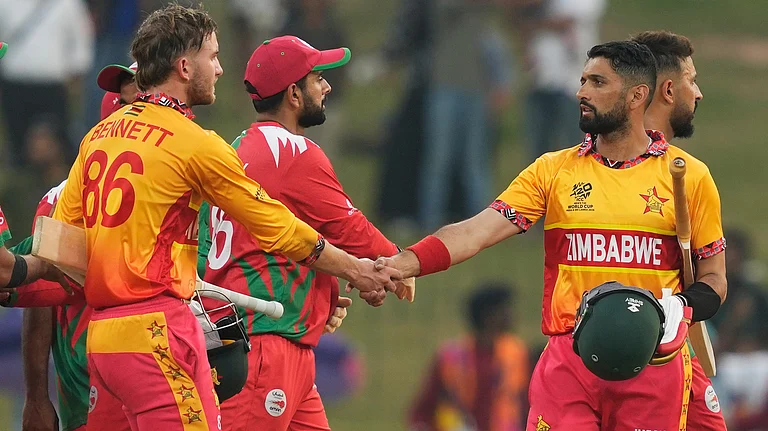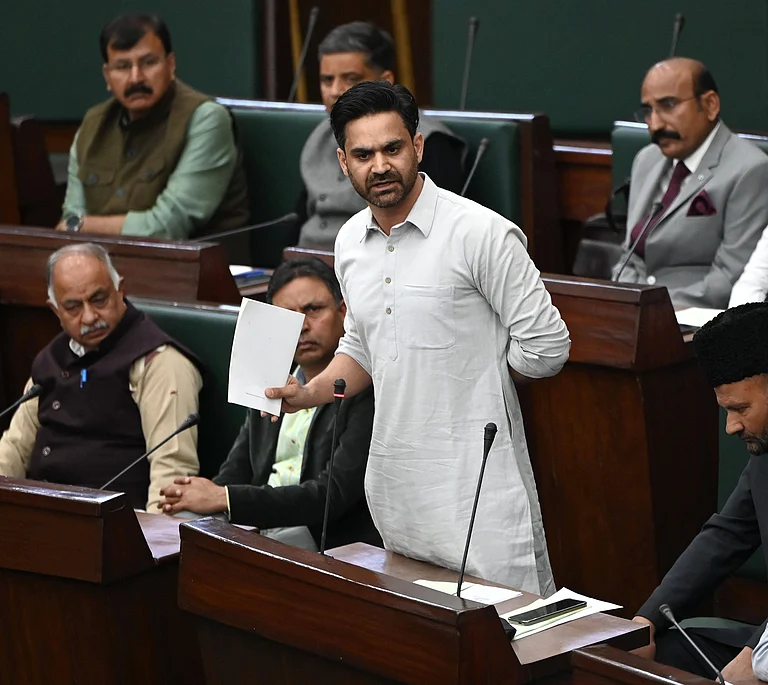AIADMK general secretary J. Jayalalitha has become the first chief minister to be declared guilty under the Prevention of Corruption Act. Though the judgment is bound to affect her political fortunes and that of her party, no one for now knows what the magnitude and impact of this ruling would be.
At present, the AIADMK is more worried about the political fallout from the violence unleashed by Jayalalithas supporters on the day special judge V. Radhakrishnan found her guilty on two counts in the Pleasant Stay Hotel case. He sentenced her to rigorous imprisonment for one year and a fine of Rs 1,000 for each of the counts. Along with Jayalalitha, the sitting AIADMK MP from Salem, T. Selvaganapathy, ias officer H.M. Pandey and two directors of the hotel, Palai Shanmugham and Rakesh Mittal, were sentenced to one year RI each.
Normally, Jayalalitha would have used the ruling to project herself as a woman being victimised by her political rivals. But this time the widespread violence that rocked the state in which three girl students of the Tamil Nadu Agricultural University were burnt alive near Dharmapuri meant that the AIADMK had to tone down its protests. The public outcry against the incident has put the party in a spot. In her characteristic style, Jayalalitha tried to blame the DMK for the violence: "The DMK is using anti-social elements and then blaming the AIADMK. I demand a CBI inquiry to bring out the truth."
The DMK hit back promptly, as electricity minister Arcot Veeraswamy accused Jayalalitha of planning the violence. "The truth behind the month-long interaction between Jayalalitha and her cadres at the venue of the tansi land purchased by her has come out. Under the pretext of counselling them, she directed them to resort to violent acts," he said.
Analysts feel the Dharmapuri incident will have an immediate impact on the three assembly byelections to be held on February 17. Its outcome may be a pointer to Jayalalithas political future. If the AIADMK wins, shored up as it is by an alliance with G.K. Moopanars TMC, the question of corruption as an election issue might lose its bite. "I will take full charge of clearing up the sinister ring of vengeance which Karunanidhi has placed around me," says Jayalalitha. "In a democracy, people are the ultimate dispensers of justice." If the DMK wins, however, it will say that Jayalalitha has been found guilty by both the peoples court as well as the courts of law.
The court judgment has created a fluid situation. Every political party is coming out with its own interpretation of what would unfold in the run-up to the full-fledged assembly elections next year. The DMK and its allies are of the opinion that Jayalalitha is likely to be convicted in more cases and might be debarred from contesting the elections. The outcome of the assembly elections in Bihar, Orissa and Haryana will further weaken the Congress and the present grand alliance of parties opposed to the BJP might not even be there in 2001 when Tamil Nadu goes to the polls. "Like the TDP, we will get another term based on our performance," says a senior DMK leader. "People are enlightened enough to compare the DMK rule with the AIADMK rule and our style of governance alone should see us through."
The AIADMK has a different take. "The judgment has created sympathy for me," says Jayalalitha. "We will win the three byelections to the state assembly." According to her, the countdown for the DMKs fall has already begun. Her new found ally-the TMC-feels the DMK cannot get a new lease of life
by just blaming the previous AIADMK regime. Says Peter Alphonse, TMC general secretary and MP: "How long will the people accept the DMKs one-point programme of blaming the AIADMK for everything? The DMK has to pay the price for its own omissions and commissions."
In private, AIADMK leaders point out that even if the verdict in some cases go against Jayalalitha, she can still lead the party provided the conviction is for one year-like in the Pleasant Stay Hotel case. A problem will arise only if the sentences are for longer periods leading to her debarment. "She is the partys only mascot," says an AIADMK functionary. "If she manages to remain in the race, she has the potential to pull off a win. If she is not there, it becomes difficult." The AIADMK leadership is hoping that the legal process would be lengthy, and if she manages to win the elections before the high court or Supreme Court convicts her, it might well be curtains for all the cases against her.
Politically, the verdict is not going to affect the alliance forged under the AIADMK banner. All the parties supporting the AIADMK have pledged their support to the "secular formation" as the fight is against the communal conglomeration headed by the BJP. Even the TMC feels the legal issues must be dealt with separately from the political ones. Though rattled and disturbed by last weeks violence, the allies feel the public anger against the AIADMK will subside in due course. A. Nallakannu, CPI state general secretary, says: "It is not proper for people sitting in glass houses (a reference to the DMK government) to throw stones."
Strangely, the AIADMK cadres saw Justice Radhakrishnan as a messiah when he discharged Jayalalitha and former finance minister V.R. Nedunchezhiyan from the "coal import case" a few months ago. Now that he has found Jayalalitha and the others guilty of granting exemption to the Pleasant Stay Hotel management to construct five additional floors in violation of rules, the party spin doctors are indulging in mudslinging exercises. Jayalalitha has accused Karunanidhi of intimidating the judiciary. "The result of the intimidation is being seen now," she says. The AIADMK leader is preparing to appeal against the special courts verdict. "The verdicts given by the special court set up by the Karunanidhi government are not final and all avenues are open to seek justice and establish our innocence," she says. A legal and political battle is hotting up in Tamil Nadu. It will chart the course of Dravidian politics.


























